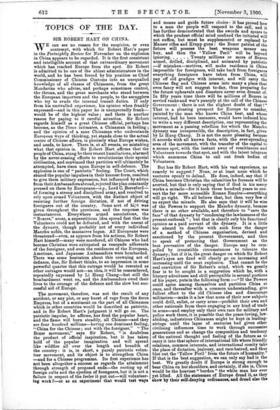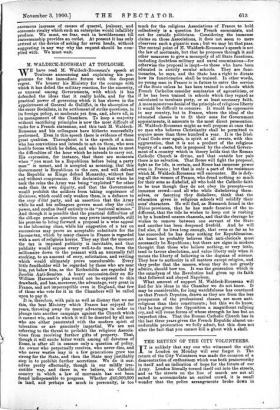TOPICS OF THE DAY.
SIR ROBERT HART ON CHINA.
E can see no reason for the suspicion, or even contempt, with which Sir Robert Hart's paper in the Fortnightly Review for November on the explosion in China appears to be regarded. It is the first consistent and intelligible account of that extraordinary movement which has reached Europe from the spot. Sir Robert is admitted to be one of the ablest administrators in the world, and he has been forced by his position as Chief Commissioner of Chinese Customs into an unequalled knowledge of all classes of Chinamen, from the great Mandarins who advise, and perhaps sometimes control, the throne, and the great merchants who stand between the European importers and the people, to the smugglers who try to evade the internal transit duties. If only from his unrivalled experience, his opinion when frankly expressed—and in this paper he is unexpectedly frank— would be of the highest value ; and there is another reason for paying to it careful attention. Sir Robert regards himself as a great Chinese official, perhaps has become, as the Times intimates, a Chinaman in feeling ; and the opinion of a sane Chinaman who understands European ways of thinking, yet stands close to the actual centre of Chinese affairs, is precisely what Europe wishes, and needs, to know. There is, at all events, no mistaking what that opinion is. Sir Robert Hart affirms that the people of China, stung by their recent humiliations, alarmed by the never-ceasing efforts to revolutionise their special civilisation, and convinced that partition will ultimately be attempted, have risen upon Europe in self-defence. The explosion is one of "patriotic" feeling. The Court, which shared the popular impulses in their keenest form, resolved to give them military expression, but influenced by advice from theirAmhassad ors abroad, rejected the plan constantly pressed on them by Europeans—e.g., Lord C. Beresford- of forming a strong and disciplined army, and resolved to rely upon armed Volunteers, with the distinct object of resisting further foreign dictation, if not of driving foreigners out of the country. Some sort of hiot was given throughout the provinces, and the response was instantaneous. Everywhere armed associatioue, the "Boxers," arose, a, superstitious idea spread fast that the Volunteers could not be defeated, and with the assent of the dynasty, though probably not of every individual Manchu noble, the massacres began. All Europeans were threatened—even, as appears from his actions, Sir Robert Hart himself—many were murdered, all Chinese who had become Christian were extirpated as renegade adherents of the foreigner, and even the residences of the European, American, and Japanese Ambassadors were bombarded. There was some hesitation about this crowning act of defiance, due, Sir Robert thinks, to an impression in some powerful quarter that this outrage would be resented as other outrages would not—an idea, it will be remembered, repeatedly expressed by Li Hung Chang—but still the bombardment went on, and the Ambassadors owed their lives to the courage of the defence and the slow but suc- cessful aid of Europe.
The movement, therefore, was not the result of any accident, or any plot, or any burst of rage from the fierce Empress, but of a sentiment on the part of all Chinamen which in other countries would be described as patriotic, and in Sir Robert Hart's judgment it will go on. The patriotic impulse he affirms, has fired the popular heart, and the flame will burn steadily, all Chinese—and they are four hundred millions—having one dominant feeling, "China for the Chinese ; out with the foreigner." 'The Boxer movement," says Sir Robert, " is doubtless the product of official inspiration, but it has taken bold of the popular imagination and will spread like wildfire all over the length and breadth of the country : it is, in short, a purely patriotic volun- teer movement, and its object is to strengthen China —and for a Chinese programme. Its first experience has not been altogether a success as regards the attainment through strength of proposed ends—the rooting up of foreign cults and the ejection of foreigners, but it is not a failure in respect of the feeler it put out—will volunteer- ing work ?—or as an experiment that would test ways and means and guide future choice it has proved how to a, man the people will respond to the call, and it has further demonstrated that the swords and spears to which the prudent official mind confined the initiated will not suffice, but must be supplemented or replaced by Mauser rifles and Krupp guns : the Boxer patriot of the future will possess the best weapons money can buy, and then the Yellow Peril will be beyond ignoring Twenty millions or more of Boxers armed, drilled, disciplined, and animated by patriotic —if mistaken—motives, will make residence in China impossible for foreigners will take back from foreigners everything foreigners }Ave taken from China, will pay off old grudges with interest, and will carry the Chinese flag and Chinese arms into many a place that even fancy will not suggest to-day, thus preparing for the future upheavals and disasters never even dreamt of. In fifty years time there will be millions of Boxers in serried ranks and war's panoply at the call of the Chinese Government : there is not the slighest doubt of that !" That is a pleasing prospect for Europe to consider, painted by the man who knows China best, and whose interest, had he been insincere, would have induced him to write a very different description, one representing the movement as a passing rebellion for which the Manchu dynasty was irresponsible, the description, in fact, given by Li Hung Chang. It is not the more pleasing because it accords with all known facts, with the ever-spreading area of the movement, with the transfer of the capital to a secure spot, with the instant sway of remittances and Volunteers towards that spot, and with the latest telegram which summons China to call out fresh bodies of Volunteers.
But has Sir Robert Hart, with his vast experience, no remedy to suggest ? None, or at least none which he ventures openly to defend. He does, indeed, say that if China becomes Christian the calamities he foresees will be averted, but that is only saying that if God in his mercy works a miracle—for it took three hundred years to con- vert the far more accessible Roman Empire—everything will go right. We all believe that, but then very few of us expect the miracle. He also says that it will be wise of the Powers to support the Manchu dynasty, because there is no other available, and therefore to "save the face" of that dynasty by "condoning the lawlessness of the present outbreak " ; but that is clearly only his functional opinion as a paid servant of the dynasty. It is a little too absurd to describe with such force the danger of a method of Chinese organisation, devised and sanctioned by the present Government, and then to speak of protecting that Government as the best preventive of the danger. Europe may be com- pelled by irresistible circumstances to tolerate the dynasty; but if it is, the great danger on which Sir Robert Hart's eyes are fixed will clearly go on increasing and increasing until the next explosion. That cannot be the real conviction of Sir Robert's mind, which we greatly fear is to be sought in a suggestion which he, with a literary adroitness and skill perceptible in several portions of his paper, puts in the following form :—"If the Powers could agree among themselves and partition China at once, and thereafter with a common understanding, give fullest effect to the old Chinese idea and discourage militarism—make it a law that none of their new subjects could drill, enlist, or carry arms—prohibit their own and other nationals from there engaging in any kind of trade in arms—and employ only their own race for military and police work there, it is possible that the peace-loving, law- abiding, industrious Chinaman might be kept in leading- strings until the lapse of centuries had given other civilising influences time to work through successive generations and so change the composition and tendency of the national thought and feeling of the future as to carry it into that sphere of international life where friendly relations common interests, and international comity take the place: of dictation, jealousy, and race-hatred, and thus blot out the 'Yellow Peril' from the future of humanity." If that is the best suggestion, we can only say bad is the best. We greatly doubt if Europe is strong enough to bear China on her shoulders, and certainly, if she is, China would be the heaviest " burden" the white man has ever yet lifted. All the statesmen of Europe dread it, as they show by their selfolenying ordinances, and dread also the enormous increase of causes of quarrel, jealousy, and economic rivalry which such an enterprise would infallibly produce. We must, we fear, wait in bewilderment till statesmanship provides an outlet. At present it has only arrived at the device of asking for seven heads, without suggesting in any way why the request should be com- plied with. We must wait.























































 Previous page
Previous page